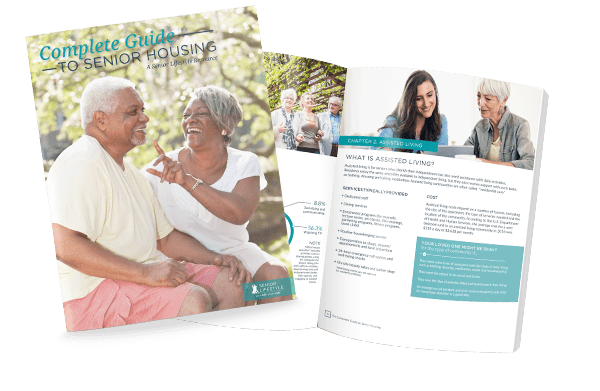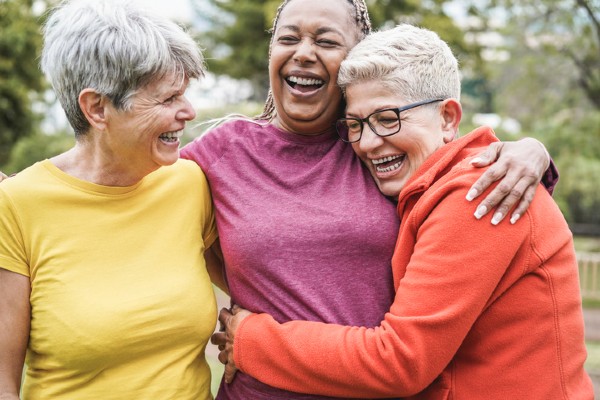Loneliness seems to be endemic to growing older. A 2018 survey by the AARP found that 35% of people over age 45 called themselves lonely. When the survey was first conducted in 2010, that percentage was the same, but now that the population has grown, it means 5 million more people today consider themselves lonely, a total of about 48 million people.
That loneliness persists for many. Of these lonely people, 41% say they’ve been isolated for six years or more, while 31% have been lonely for one to five years, and 26% for up to a year.
There are many ways to feel less lonely, but there seems to be no substitute for the real companionship of friends. As we get older, our friends and family move around, and health challenges can make it more difficult to go out, see old friends, and make new ones. Add to that is the uncertainty of how to make more friends.
Here is a look at the benefits of friends as you age and how to make new friends when you’re older.
Why You Should Make Friends as You Get Older
Studies have shown a strong link between maintaining social connections and having better overall mental and physical health, as well as a more positive outlook on life.
Here’s what you miss by not having friends, and what you gain.
5 Negative Effects of Not Having Friends
- Elevated risk of heart disease – People who suffer from loneliness or social isolation are 29% more likely to develop coronary heart disease and 32% more likely to have a stroke than those who were socially engaged, according to a study by the National Institutes of Health.
- Higher cognitive decline and risk of dementia – According to a study published by the Journal of Neurology, Neurosurgery & Psychology, feelings of loneliness in seniors increased their risk of dementia by more than 60%.
- Increased risk of death – Older adults who reported feeling lonely had a 45% increase in risk of death, along with a 59% higher risk of mental and physical decline, according to another study from the NIH.
- More long-term illness – Seniors who live alone experience conditions such as arthritis, chronic lung disease, depression and impaired mobility at higher rates than those with strong social support, according to the World Health Organization.
- Vulnerability to abuse and scams – Isolated seniors experience abuse and are victims of scams at higher rates than seniors with friends and support around them, according to the NIH.
5 Positive Effects of Having Friends
- Better mental health – Psychology Today says friendly interactions can boost feelings of well-being and decrease feelings of depression, which can be common especially among senior citizens.
- Decreased risk for dementia – The NIH says staying socially connected can help slow cognitive decline, and lessen many of the effects and symptoms of dementia.
- Improved physical health – The National Institute on Aging says socially active adults have lower levels of an inflammatory factor associated with several age-related conditions, including Alzheimer’s disease, cardiovascular disease, osteoporosis and rheumatoid arthritis, along with some forms of cancer.
- Increased longevity – Seniors with more social support tend to live longer than those who are more isolated, the Psychology Today article reports. Harvard Health says social connections are as vital for longevity as getting enough sleep, eating well and quitting smoking.
- Stronger sense of purpose and belonging – Developing strong relationships with others has been shown to boost self esteem, increase feelings of fulfillment and build lasting bonds. That in turn can positively affect other positive health behaviors, such as being more active, eating well and quitting bad habits, like smoking, according to the NIH.

Download The Complete Guide to Senior Housing
Every senior has their own set of wants and needs, so retirement communities offer differing levels of care, services, and amenities. Read our eBook for a detailed look at what retirement communities provide.
Download the Guide10 Ways to Make Friends When You’re Older
There are a number of simple ways to make friends as you age. Here are a few.
1. Attend religious services
Whether in person or online, going to a church, mosque or synagogue is a great way to find like-minded individuals. Religion can be a connecting force, and today’s places of worship are offering online opportunities and discussion groups. If you’re not religious, but are spiritual, you can find similar groups.
2. Connect with activity groups
Activity groups around the country center on common interests. Many are for older adults seeking community and friendship. Check community centers, churches and senior centers around you. Online, look into AARP communities, Facebook Groups or Meetup.com.
3. Enroll in continuing education
Continuing education and lifelong learning courses can connect people, and keep minds sharp and engaged. Classes can be academic, like history or languages, or just activity-based, such as music and sewing.
4. Extend social invitations
Invite a friend to join you for coffee or lunch. Also, accept when you’re invited out, too. Then turn it around again by inviting them to lunch or coffee. You’ll quickly find your schedule filled with friendship.
5. Go on a date
Friendship doesn’t have to stop at 50, and neither does romance. Dating can be done in person or online, for a deeper connection or just companionship. Some dating sites, including OurTime and SilverSingles, specialize in people over age 50.
6. Join support groups
Life brings changes, and support groups can be a great way to feel comforted as you navigate these challenges. These groups can help seniors understand their feelings of loneliness and regain a sense of purpose.
7. Starting exercising
Taking an exercise class or joining a fitness group can be a great way for older adults to get active, and become part of a dynamic community. Options can range from senior dance classes to walking clubs, water aerobics sessions to yoga meetups.
8. Strike up a conversation
Introducing yourself to a stranger can feel awkward or intrusive, but asking questions can help break the ice. What’s that coffee drink you’re ordering? How’s that book you’re reading? Listen and share in return, and you might just make a new friend.
9. Take a trip
Taking a year off to travel before retirement – a “gap year” – is a recent senior phenomenon. One of the biggest benefits of traveling is the social environment. Traveling is always a way to meet new people and bond over the shared experience of the trip.
10. Volunteer or get a part-time job
Giving back can be a fulfilling and empowering activity for older adults, plus it’s an easy, convenient way to meet like-minded new people. Service organizations always need volunteers, as do hospitals, schools and the like. If you still want to work, a part-time gig can keep your skills sharp and provide you with another important social outlet.
Find Friends and Security at a Senior Lifestyle Community
Senior Lifestyle understands the importance of social connections. That’s why we’ve developed a calendar of engaging programming to encourage meaningful connections between residents, their friends and their families through classes, games, recreation and technology.
>> Read The Mental Health Benefits of Socializing for Seniors
Find out more about Senior Lifestyle communities today.

